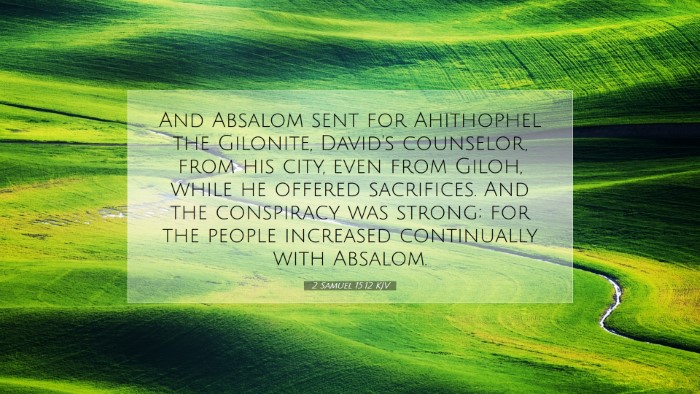Commentary on 2 Samuel 15:12
Verse: "And Absalom sent for Ahithophel the Gilonite, David's counsellor, from his city, even from Giloh, while he offered sacrifices. And the conspiracy was strong; for the people increased continually with Absalom."
Introduction
This verse serves as a critical juncture in the narrative of Absalom's rebellion against King David. The selection of Ahithophel as a counselor signifies the seriousness of Absalom's intentions and the gravity of the conspiracy taking shape. Understanding the implications of this verse provides insights into themes of betrayal, ambition, divine sovereignty, and human folly.
Insights from Matthew Henry
Matthew Henry highlights the significance of Absalom’s actions in this verse as not mere political maneuvering, but as a manifestation of profound personal ambition and treachery. He remarks upon the choice of Ahithophel, citing his reputation as a wise counselor, which underscores Absalom's desire for validation and legitimacy in his revolt against David.
- Betrayal of Trust: Henry points out that Ahithophel was once trusted by David, making his alignment with Absalom a deep betrayal that illustrates the pain of betrayal within familial and political relationships.
- Symbolic Significance of Sacrifices: The mention of offerings serves to highlight the religious and moral undertones of the conspiracy, suggesting that even in rebellion, Absalom seeks the blessing of God, ironically contradicting his sinful pursuits.
Insights from Albert Barnes
Albert Barnes elaborates on the strategic planning of Absalom, emphasizing his manipulative tactics. Absalom’s sending for Ahithophel indicates a calculated move to solidify his power base. Barnes draws attention to several key elements:
- Political Strategy: By enlisting Ahithophel, Absalom is not just gaining counsel but is strengthening his cause in the eyes of the people, as Ahithophel was widely regarded as a wise and reliable advisor.
- The Growing Conspiracy: Barnes notes, "the conspiracy was strong," indicating that Absalom's rebellion was gaining momentum and that the people's support was gradually shifting from David to Absalom, demonstrating the volatility of public opinion in times of crisis.
Insights from Adam Clarke
Adam Clarke provides a detailed insight into the socio-political context of Absalom's rebellion. His commentary delves into the broader implications of the actions described in this verse:
- Ahithophel's Role: Clarke emphasizes the influence of Ahithophel, detailing how his counsel was akin to divine oracles in the eyes of many, which adds weight to Absalom's conspiratorial endeavors.
- Divine Sovereignty: Clarke reflects on the overarching theme of divine sovereignty at play, suggesting that despite Absalom’s actions, God’s purposes would ultimately prevail, reminiscent of David's earlier trials.
Thematic Analysis
The themes prevalent in this verse resonate deeply with the broader narrative of Scripture:
- Betrayal and Loyalty: The conflict between Absalom and David serves as a microcosm of the struggles within the human heart, illustrating the tension between loyalty to God and personal ambition.
- Divine Justice: This verse foreshadows the eventual downfall of Absalom, reinforcing the biblical principle that wrongdoing does not go unpunished.
- Human Ambition: The verse serves as a sobering reminder of how human ambition can lead to catastrophic consequences for oneself and others.
Practical Applications
For pastors, students, theologians, and Bible scholars, this commentary on 2 Samuel 15:12 presents critical reflections that can be applied in various contexts:
- Awareness of Betrayal: Recognizing the potential for betrayal in personal experiences can foster awareness and guide toward greater integrity and transparency in relationships.
- Examination of Motivations: This passage challenges individuals to examine their motives, ensuring that ambition does not eclipse moral and communal responsibilities.
- Trust in Divine Sovereignty: The narrative encourages believers to trust in God’s sovereignty, especially in times of turmoil, knowing that ultimate justice belongs to Him.
Conclusion
2 Samuel 15:12 encapsulates the complexities of human relationships and the dynamics of power. Through examining the insights from Matthew Henry, Albert Barnes, and Adam Clarke, we gain a multifaceted understanding of rebellion and its consequences. This analysis highlights the need for vigilance in our spiritual lives and in our communities, reminding us of the importance of loyalty, the dangers of ambition, and the assurance of God's divine oversight in all circumstances.


